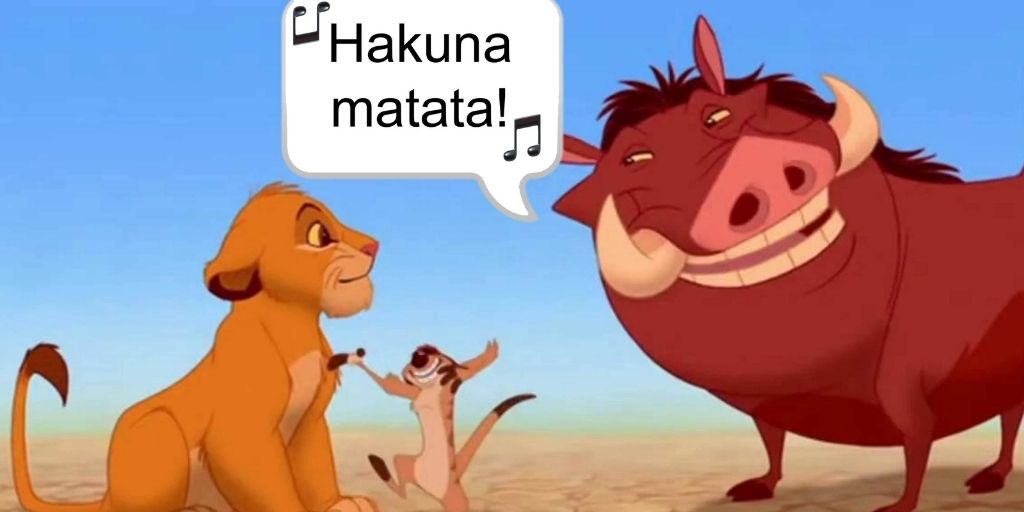You may well have heard the phrase Hakuna Matata before, but are unsure of its meaning. Put simply, ‘Hakuna Matata’ is a Swahili phrase that means ‘no troubles’, similar to the Australian expression, ‘no worries.’
Swahili, or Kiswahili, is a trade language that originated on East Africa’s coast and has loan words from Arabic, Farsi, Hindustani, Portuguese and Malay. Today 120-150 million people speak Swahili.
The term Hakuna Matata was popularized internationally by the 1994 Disney film, The Lion King. The idea behind the phrase is that you shouldn’t be troubled by things outside your control. Tim Rice and Elton John wrote the song Hakuna Matata for The Lion King movie, which earned an Academy Awards nomination for Best Original Song and propelled the expression into the Western world.

Hakuna Matata, sung by Pumbaa the Disney warthog
Hakuna Matata meaning broken down
Two Swahili words form the phrase:
- Hakuna ‘there are no/there is no’
- Matata, the plural of the word ‘problem’
The meaning of Hakuna Matata is reminiscent of the feel-good tune, “Don’t Worry Be Happy,” popularized in the 1980s by singer-songwriter Bobbie Ferrin.
Since The Lion King’s release, it’s common to hear English speaking visitors to East Africa—or other places where Swahili is spoken—greeting each other with the words ‘Hakuna Matata.’ However, East Africans use Hakuna Matata not so much as a greeting but rather as a response to a greeting or as a type of condolence.
Hakuna Matata and other Swahili phrases
Hakuna Mata is mainly used in greetings as when someone asks, ‘How are you?’ A response could be, ‘No problem or conflict – Hakuna Matata.’
Sometimes it is used in admitting to doing a specific task without complaints like ‘Can you please help me prepare lunch today?’ ‘Hakuna Matata,’ could be the response,’ explains Douglas Mmari, a Tanzanian radio show host. ‘I don’t use these words. They’re a kind of slang language that is mostly used for tourists like the word, ‘Jambo.’’ Jambo is another Swahili greeting.
Instead, “Karibu” or “Habari” is the welcome greetings that you’ll hear many Swahili speakers use.
Another Swahili proverb that starts similar to Hakuna Matata is Hakuna masika yasiyokuwa na mbu, which translates as ‘There isn’t a rainy season without mosquitoes.’ The meaning behind the saying is, ‘there’s always some bad that comes with the good,’ which is pretty similar to the Western expression ‘every rose has a thorn.’
More Swahili words to know when you visit East Africa for a safari are:
Asante: Thank you
Kwaheri: Goodbye
Safari: Journey
Simba: Lion
Tembo: Elephant
Twiga: Giraffe
Hakuna Mata the song
In the animated movie, a meerkat named Timon and a warthog called Pumbaa croon the song Hakuna Matata as a philosophical conversation. Pumbaa’s name comes from another Swahili word, which is said to mean being foolish, silly, weak-minded, careless or negligent. They sing:
“Hakuna Matata!
What a wonderful phrase
Hakuna Matata!
Ain’t no passing craze
It means no worries
For the rest of your days
It’s our problem-free philosophy
Hakuna Matata!”
Tim Rice, an English lyricist known for his collaborations with Andrew Lloyd Webber, wrote the words. Elton John composed the music. Rice also worked with Disney on Aladdin and the stage adaptation of Beauty and the Beast.
Here’s the Hakuna Matata song in full:
After Disney trademarked the Swahili words Hakuna Matata for use on t-shirts, it caused an uproar in the African community. Some activists think the trademark perpetuates colonialism, while others charge Disney with cultural appropriation of the Swahili language. They argue that language should not be patented.
And that’s the end of our take on Hatuna Matata meaning. We hope you found it useful! So the next time that you want to refrain from taking anything too seriously, simply remember the meaning of Hakuna Matata, “There are no problems.”
We’d to hear your take on this classic Swahili phrase – let us know your thoughts using the comments section below.


